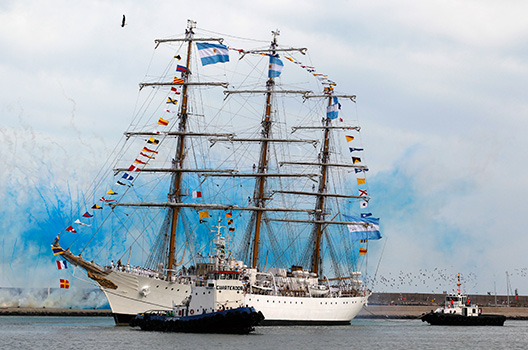 Earlier this week, Argentine stocks plummeted after the US Supreme Court refused to hear an appeal from the Argentine government in an epic court battle with angry investors. The case pitted Argentina against US-based investors, both big and small, who lost fortunes during the South American country’s 2001-2002 economic implosion when it defaulted on its bonds—a total loss of nearly $100 billion. Among other holdouts, the New York-based hedge fund NML Capital Limited refused a restructuring of bonds it held and instead sought legal redress for the almost $1.3 billion face value of the IOUs it held. The Supreme Court’s ruling backs up a Ghanaian court which, two years earlier, concluded that Argentina should pay back its creditors.
Earlier this week, Argentine stocks plummeted after the US Supreme Court refused to hear an appeal from the Argentine government in an epic court battle with angry investors. The case pitted Argentina against US-based investors, both big and small, who lost fortunes during the South American country’s 2001-2002 economic implosion when it defaulted on its bonds—a total loss of nearly $100 billion. Among other holdouts, the New York-based hedge fund NML Capital Limited refused a restructuring of bonds it held and instead sought legal redress for the almost $1.3 billion face value of the IOUs it held. The Supreme Court’s ruling backs up a Ghanaian court which, two years earlier, concluded that Argentina should pay back its creditors.
The dispute between Argentina and NML has repeatedly ended in rulings that favor the fund, which have been ignored and even purposefully subverted, by Argentina. While refusing to hear the appeal, the US Supreme Court also ruled 7-1 that the holdouts can force Argentina to reveal its foreign properties, a ruling which sets the groundwork for an eventual awarding of Argentina’s foreign assets to holdouts as payment.
The dispute’s outcome could seriously impact the ability of developing nations to access the global financial system, which is vital to providing much-needed foreign capital to the developing world. Especially for African countries, which desperately need the funds to upgrade infrastructure and carry out development projects, the degree to which investors have confidence in the safety of their investments is vital. As Africa Center Director J. Peter Pham noted in 2012, part of Ghana’s success in attracting $8 billion in foreign direct investment in 2011 was the guarantee that partners would be repaid, and that a free and fair judiciary existed to reinforce their rights.
Argentina now faces two hard choices: cough up $907 million to NML by the end of June, a move that would, politically, cost Argentine President Cristina Férnandez de Kirchner immensely (not to mention the payment could decimate Argentina’s currency reserves and potentially further destabilize the country’s economy); or, lose access to the US—and, potentially, the global—financial system. Notably, if Argentina acquiesces to what Férnandez has decried as “vulture funds” and pays NML, it might open the floodgates to other dissatisfied holdouts, at a price possibly as high as $15 billion to Argentina.
Just two years prior, tensions between NML and Argentina came to a head when Ghanaian authorities detained the flagship of the Argentine navy, the ARA Libertad, after it arrived in the port city of Tema on October 1, 2012. The impoundment was in accordance with a Ghanaian court order that ruled in favor of NML’s petition to seize the vessel satisfy an award by a US judge that Argentina contumaciously refused to pay. Argentina challenged the ship’s detainment to no avail in Ghanaian court.
Ghana’s decision to impound the ship represented a commendable commitment to the rule of law for a West African nation that has often been hailed as a model for democracy on the continent. The court’s decision was also fiscally responsible; it demanded that governments be held accountable for debts defaulted upon. As Washington Post editorial writer and former Supreme Court correspondent Charles Lane notes in his column this week, the ruling is a needed “shake-up” of the status quo, and may result in more responsible borrowing and lending practices. The shake-up, if true, could incentivize developing nations to create and enforce rigid lending and borrowing laws, which in turn attract private investment.
The Ghana-Argentina dispute was hastily resolved by a United Nations tribunal decision, which Pham called a blow to “both the rule of law and fiscal probity” in December 2012. The International Tribunal for the Law of the Sea abused the concept of sovereign immunity, which Argentina had explicitly waived in order to get the loans it subsequently defaulted on (it is unlikely it would have obtained the credit without the waiver), and instead released the seized warship back to Argentina, nullifying the need for either Ghana or Argentina to move forward with legal proceedings.
This week’s Supreme Court ruling is not a win for those who were victimized by Argentina’s prolonged refusal to pay its obligations, it also upholds the binding nature of contracts freely entered by nations, and underscores the importance of global fiscal responsibility—enforced by the courts, if necessary—that is key to development in Africa and around the world.
Image: Argentine flagship vessel ARA Libertad, which was seized by Ghanaian authorities in October 2012 amid a dispute over defaulted government bonds. REUTERS/Enrique Marcarian
